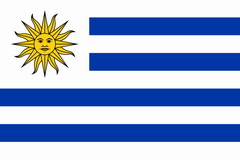Login form
Customs of Uruguay
Marriage and Family
 Traditionally, a man must seek a woman’s parents’ approval before getting engaged. Both families play a large role in preparing for the wedding, and the two families often associate closely after their children are married. The marriage reception usually includes a formal, catered party from which the couple generally leaves early.
Traditionally, a man must seek a woman’s parents’ approval before getting engaged. Both families play a large role in preparing for the wedding, and the two families often associate closely after their children are married. The marriage reception usually includes a formal, catered party from which the couple generally leaves early.
Although extended families do not live together, they play an important role in the social lives of Uruguayans. The father is considered the head of the family and rarely does any household work. Many women work or study outside the home. The average family has two children. Most families rent rather than own their house or apartment.
Eating
Although fish, seafood, and meats such as chicken and pork are eaten in
Although habits are changing in urban areas to accommodate cosmopolitan schedules, traditionally Uruguayans eat a small breakfast and have their main meal at midday. When possible, many workers go home for this meal. The evening meal is usually eaten after 8 pm and sometimes much later. Children usually have a snack when they get home from school.
Uruguayans keep their hands (not elbows) above the table, not in the lap, during meals. When finished eating, a person usually places the utensils side by side on the plate. It is common to wipe the plate clean with bread when finishing.
Socializing
The most common way to greet someone is with a warm, firm handshake. Among friends or people they know well, however, women generally brush cheeks and “kiss the air,” and men might use an abrazo (hearty hug). Verbal greetings depend on the time of day or situation. ¡Hola! (“Hi”) is common for a casual greeting at any time. ¡Buen día! (“Good day”) is more formal. In cities people do not generally greet strangers when passing on the street, but in rural areas they are more likely to do so. At a social function it is usual to greet every member of a small group individually. Close friends and family members address each other by their first names, but in general people use professional titles or Señor (“Mr.”), Señora (“Mrs.”), or Señorita (“Miss”) with the family name.
People prefer that visits be arranged in advance, and it is impolite to call on someone unexpectedly during mealtime. Uruguayans are considerate hosts, and they expect their guests to show respect by making clear their appreciation of the hosts’ hospitality and by not making themselves too much at home.
Recreation
Fútbol (soccer) is the national sport. Basketball, volleyball, swimming, and other water sports are also popular, and domos (rodeos) draw crowds. Uruguayans also enjoy going to the cinema, watching television, and attending cultural events. Going to the beach is very popular, especially during summer holidays.
Holidays and Celebrations
The most important holidays in Uruguay are New Year’s Day (1 January); Carnaval; Easter, including Holy Thursday and Good Friday; the Landing of the 33 Patriots (19 April), which honors those who fought for independence in 1825; Labor Day (1 May); Constitution Day (18 July); and Independence Day (25 August). Christmas Eve (24 December) and Christmas Day (25 December) are also celebrated. Most Catholics have celebrations to honor local patron saints, and some celebrate name days, which are the feast days of the saints for whom babies are named. Christmas Eve and New Year’s Eve are celebrated with large family parties and midnight fireworks.
Source: Encarta Interactive World Atlas

